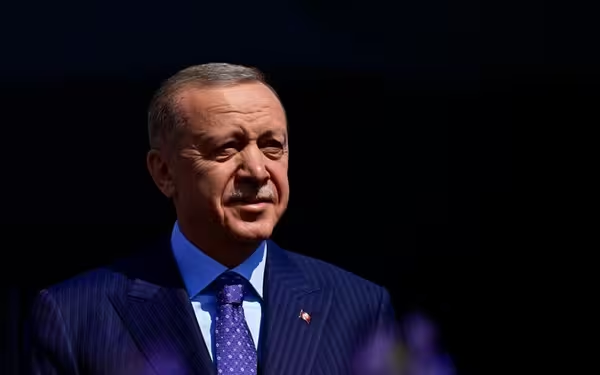Saturday, November 16, 2024 05:32 PM
Erdogan's Vision for Türkiye: Balancing East and West Relations
- Türkiye deepens ties with Eastern nations while engaging the West.
- Erdogan denies any shift away from Western alliances.
- Strategic balancing act positions Türkiye as a global player.
 Image Credits: arabnewspk
Image Credits: arabnewspkErdogan emphasizes Türkiye's commitment to balancing ties with Eastern nations while maintaining Western alliances.
In recent years, Türkiye has been navigating a complex geopolitical landscape, balancing its traditional ties with the West while exploring new partnerships in the East. President Tayyip Erdogan's recent statements highlight this dual approach, emphasizing that Türkiye will continue to deepen its relationships with Eastern nations, including members of the BRICS group and the Shanghai Cooperation Organization (SCO), while still maintaining its connections to Western allies.
As a member of NATO, Türkiye has historically aligned itself with Western powers. However, the country's interest in joining BRICS and SCO has raised eyebrows in the United States and Europe. These groups include significant players like China and Russia, which has led to concerns that Türkiye might be shifting away from its Western alliances. Despite these fears, Erdogan has firmly denied any notion of an “axis shift,” asserting that Türkiye is simply adapting to the evolving global landscape.
During a recent event in Ankara, Erdogan stated, "That is the approach that lies behind our country’s will to expand the basis of dialogue with all of them, from the Shanghai Cooperation Organization to BRICS and ASEAN." This statement underscores Türkiye's commitment to engaging with various global powers, regardless of their geopolitical affiliations.
Furthermore, Erdogan clarified, "Of course, our face is turned to the West, but this certainly does not mean that we will turn our backs on the East, that we will ignore the East, or not improve our ties with the East." This sentiment reflects a strategic balancing act, where Türkiye seeks to leverage opportunities from both sides of the geopolitical spectrum.
BRICS, which includes Brazil, Russia, India, China, South Africa, Ethiopia, Iran, Egypt, and the United Arab Emirates, aims to challenge Western economic dominance. Meanwhile, the SCO, established in 2001 by Moscow, Beijing, and Central Asian states, serves as a political, economic, and security alliance that counters Western influence.
Türkiye's approach under Erdogan's leadership illustrates a significant shift in its foreign policy strategy. By engaging with both Eastern and Western powers, Türkiye is positioning itself as a pivotal player in the global arena. This balancing act not only reflects the changing dynamics of international relations but also highlights the importance of adaptability in a world where alliances are constantly evolving. As Türkiye continues to navigate these waters, the implications of its dual approach will be closely watched by both its allies and rivals.













